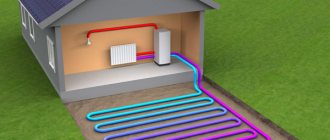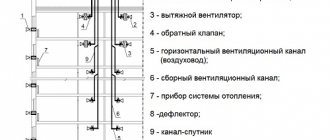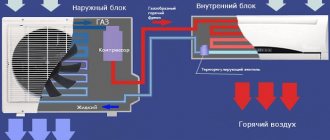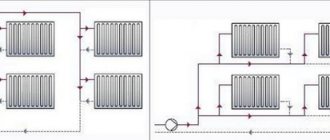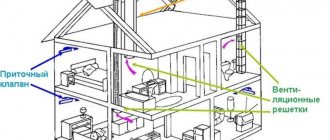Is it possible to refuse central heating?
The legislation does not provide a clear answer to this issue. On the one hand, owners are free to choose the range of services they receive from utility and service organizations. On the other hand, the heating plant is part of the common property, which means that unauthorized changes to its design are unacceptable. You will need to obtain permits, their approval, etc. The issue is easier to resolve in the private sector, but it is more difficult legally and technically to complete this step in an apartment building.
The costs of disconnecting and reorganizing the heating network will fall on the shoulders of the subscriber who wishes to disconnect.
How to do this in an apartment building?
Clause “l” of Article 33 of the Rules for the provision of utility services to owners and users of premises in apartment buildings and residential buildings, approved by Decree of the Government of the Russian Federation of May 6, 2011 No. 354, expands the rights of the consumer with contractual provisions. Any contract contains a clause on the possibility of its termination, and you can always find a reason for refusing the services of the heat supply organization.
However, according to industry regulations, disconnection from the heating plant is possible only in relation to the building as a whole, and not its individual part. Therefore, to refuse centralized heating in an apartment building, you will need to use one of the options presented in the table.
| Opt-out option | "Underwater rocks" |
| Obtain the consent of all residents | In a multi-entrance building and with a relatively good quality of service provision, this is unlikely to be possible |
| Go to court to defend your right as an owner | Even with a positive court decision, the heat supply organization can always refer to the lack of technical capabilities to re-equip the heating plant |
The head of the legal support department, Ksenia Buslaeva, answers:
Formally, the contractor providing utility services (today, in the vast majority of cases, this is a management company, that is, a management company), has the right to suspend the provision of services (in this case, heating of an apartment building, that is, an apartment building), but only for scheduled or emergency repairs. The maximum permissible period for turning off heating in an apartment building during the heating season is 24 hours during the month or no more than 16 hours at a time, provided that the temperature in the residential premises is not lower than +12°C.
In fact, the owner of an apartment in which the heating system is planned to be repaired during the heating season applies to the management company with a request to allow work to be carried out that may entail the cessation of heat supply to all or part of the premises of the apartment building. The final decision on further actions is made by the management company independently - either to authorize and carry out repair work or not.
Goal: replacing radiators
How to reduce heating bills if the radiators are barely warm?
Refusal in favor of individual heating in the apartment
From a legal point of view, the procedure for abandoning central heating in favor of an individual heating system is as follows:
- Preparation of documents:
- registration certificate for the apartment;
- ownership documents;
- consent of all persons living in the apartment.
- Selection of an autonomous heating source in accordance with fire safety requirements and operating standards.
- Obtaining a technical opinion on the possibility of carrying out such re-equipment.
- Development of a reconstruction project with calculations confirming the preservation of the functionality of the heating plant without a disconnected subscriber.
- Filling out an application.
- Obtaining permission to carry out work.
Is it possible to turn off the central heating supply in a separate apartment?
The question of whether it is possible to refuse heating in a single MKD apartment raises a lot of controversy. The highest courts have been involved in his decision more than once. The crux of the debate lies in the impact of turning off any circuit on the entire heating system, which means that other residents may suffer. As a result, the answer to this question sounds affirmative, but the refusal is accompanied by the solution of a number of technical and legal nuances.
Technical nuances
The central heating system of an MKD is a rather complex, unified network, including common risers, pipelines, shut-off valves, and control devices.
If in such a complex one simply cuts off one of the elements, i.e. apartment network, this can disrupt the functioning of the entire system. The distribution of coolant flows, pressure in the pipeline and water temperature change. Such influences are especially noticeable in apartment buildings built more than 20 years ago.
Thus, the first technical problem is to prevent the heating in other apartments from deteriorating when one consumer is disconnected . Only specialists can assess the degree of influence, which means that the involvement of professionals is required.
One more nuance needs to be taken into account. In the vast majority of heating system schemes, it is impossible to completely eliminate contact between the apartment being switched off and the central heating system. Only the branch is disconnected, i.e. internal radiators and connections to them. The riser and return line remain in place. They will continue to give off some of the heat as they cross the room.
This additional energy loss must be paid by the apartment owner, even after turning off the heating.
The technical challenges of eliminating central heating require the following steps:
- development and approval of draft changes;
- disconnection of a separate apartment from the general network by a special team;
- making changes to the technical passport of the MKD heating system.
You cannot carry out pipe cutting work yourself.
Legal aspects
The legislation of the Russian Federation does not provide for direct prohibitions on the refusal of central heating, and any owner has the right to such an action.
However, since 2011, Law No. 190-FZ “On Heat Supply” has become the fundamental document regulating the relationship between heat supply organizations and consumers.
Refusal of central heating, in any case, involves dismantling radiators and pipes, installing plugs and other technical measures. All this falls under Article 25 of the Housing Code of the Russian Federation, which relates them to the reconstruction of residential premises.
Changes to Chapter 4 of the Housing Code of the Russian Federation and the provisions of the Town Planning Code are regulated. They must be carried out in accordance with the current Laws of the Russian Federation and coordinated with local governments.
The competent authority issues a permit only if the changes do not significantly disrupt the heat supply system of the apartment building. If the house has a circuit designed only for central heating, then switching to individual sources is not allowed, but abandoning it is possible only by turning off the radiators.
The safety of changes in the apartment heating system must be confirmed by sanitary and epidemiological services, and alternative heat sources must have a fire safety certificate, a certificate of conformity and permission from Rostechnadzor.
Declaration of refusal
An application for refusal of services from a heat supply organization as a document does not have a unified form. Climatic conditions in the Russian Federation do not imply a complete abandonment of heat supply; we are usually talking about replacing central heating systems with local units. However, this procedure will already be considered reconstruction and redevelopment, therefore the form of the application is determined by the regulations in force in this area.
Form
The application form was approved by Decree of the Government of the Russian Federation dated April 28, 2005 No. 266 and is a form that contains all information about the object, its owners, attached documents, etc.
How to write correctly?

When making an application, you will need to enter the following information into the form:
- the name of the departmental committee of local authorities authorized to resolve issues of refurbishment of premises;
- personal and contact details of the applicant;
- information about the exact address of the redevelopment object and its owners;
- expected duration and mode of repair work;
- information about living adult household members with a note indicating the presence of notarized consent from each of them;
- listing of attached documents with details (if any) and the number of sheets occupied;
- date of filing and signature of the applicant.
Download application
Since the application form is regulated by federal regulations, the form to fill out is available here.
After downloading, you can print it out and fill it out by hand, or enter the necessary information (except signature) on your computer, and only then print it out.
How to legally refuse?
Refusal of the services of a heat supply organization requires a large amount of preliminary work:
- obtain the consent of neighbors;
- receive a positive opinion from the service organization;
- order a refurbishment project;
- coordinate it with the gas (if necessary) and fire services;
- wait for a favorable response from the redevelopment commission.
The wait for a fully completed package of documents can last for several months, not counting financial costs.
It is impossible to refuse central heating due to long-term non-residence of people in the apartment and for the purpose of recalculation, since heating is a public service that is not turned off even if a debt arises. You will also have to pay for the heat supply of entrances and basements as general house needs (clause 86 and clause 88 of the Rules according to the Decree of the Government of the Russian Federation of May 6, 2011 No. 354).
You should know!
When planning to turn off central heating in an apartment building, you should always remember the following points:
- Discuss this possibility with your neighbors. If there are supporters who want to do the same reconstruction in their own apartments, resolving issues will become much easier;
- Collect all necessary documents;
- If in order to obtain permission you will have to pay for the reconstruction of the heating main, think about whether the skin is worth the price;
- Obtain permission to carry out work;
- Purchase all necessary equipment;
- Contact a special organization for help in carrying out the work;
- Please note that according to the adopted amendments of 2011, the transition to individual heating of one specific apartment has become practically impossible. Even when turning to the courts, not all cases are won by apartment owners. Therefore, it is best to turn off the central heating upon request for the entire entrance or apartment building;
- Remember that for unauthorized disconnection from centralized heating, an individual is subject to a penalty established by law. In addition, all costs incurred for the restoration of central heating are also borne by the individual who caused the damage;
- Any decision made should be good not only for one person, but also for those around him.
So, to summarize all of the above, we can say with confidence that it is quite possible for residents in an apartment building to refuse central heating, but only this process must take place without violating the law.
Certificate of refusal
Until 2011, after re-equipping the heating system, it was necessary to submit an act of abandonment of central heating, drawn up in the presence of the owner, management company and a representative of the resource supply organization. However, after the approval by the Government of the Russian Federation of May 6, 2011 No. 354 of the Rules for the provision of utility services to owners and users of premises in apartment buildings and residential buildings, heating fees are not recalculated.
Charges for general house needs and heating of apartments occur at a single rate, regardless of whether the radiators are operating in a given room or not. The only way out in such a situation to reduce payments (it will not be possible to refuse completely) is to install an individual heat meter at the heating plant with subsequent transfer of zero readings to the Unified Center.
Thus, abandoning central heating is a time-consuming procedure complicated by bureaucratic delays. In an apartment building, this option may not be feasible at all, since it will require consent from all residents of the building. And it will not be possible to refuse heat supply services in order to save utility bills.
Difficulties
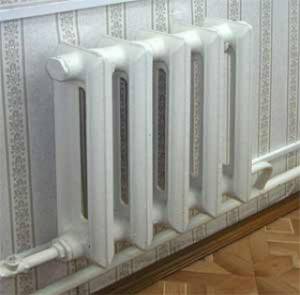
Legally disconnecting a house from the central heating system may seem simple at first glance, especially if we are not talking about a separate apartment, but about an entrance or the entire building. In practice, there are a number of difficulties. The main ones are related to Federal Law-190 “On Heat Supply”. In accordance with the provisions of this law, the transition to individual heating is prohibited, which often becomes the reason for refusal. However, it is still possible to obtain permission. The law does not prohibit the installation of individual boilers in apartments, but provides a list of them and requirements for them.
When obtaining permission for re-equipment, the type and type of boiler equipment is taken into account in the design documentation. As a result, if the project complies with the law, regulators generally will not deny redevelopment. In any case, when starting the procedure of disconnecting from central heating, you should not expect quick results. There are many difficulties in this issue. Since 2011, it has become almost impossible to disconnect one apartment from central communications.


